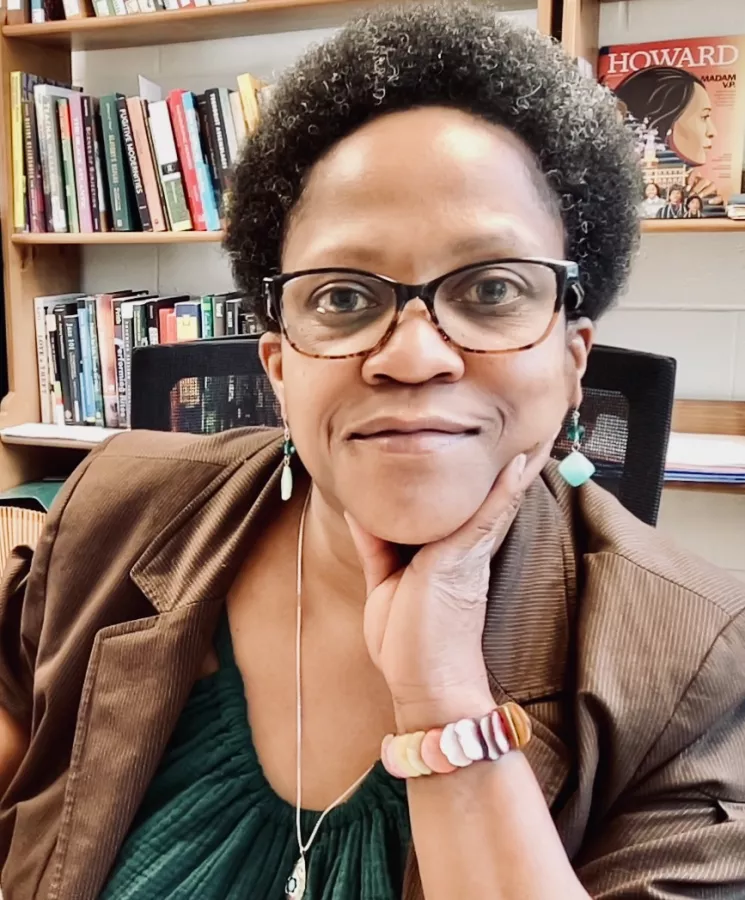Assistant Professor Tracey Stewart

Dr. Tracey Stewart
Assistant Professor of Music Tracey Stewart’s childhood dream was to be a famous trumpet player. That ambition led her to Howard University where over time the scope of her interests grew to include more than just the trumpet. As a music history major, Professor Stewart’s interest in identity and histories of race sparked her inquiries into musical connections between the Gullah Geechee people of the southeastern United States, the Akan people of Ghana, and Jamaican Maroons. After receiving her Bachelors of Music from Howard and prior to earning her Ph.D and M.A. from the University of Virginia, Professor Stewart spent ten months in Jamaica on a Fulbright research grant. It was this experience that laid the foundation for her career in ethnomusicology.
“What drew me to ethno[musicology] was just an interest in figuring out my place in the world and where I come from, which [can] get a little complicated for Black people.”
Professor Stewart spent fourteen months in total conducting research for her dissertation entitled Music, Memory, Power: Being Jamaican Maroon in the Past, Present, and Future. Her work focuses on the central role of music in representations of Jamaican Maroon identity. She explores the ways that music and dance are used by Maroons to distinguish themselves from non-Maroon Jamaicans, and to articulate ideas of nationhood, apart from and within the Jamaican nation.
Professor Stewart began teaching at Swarthmore in 2021, and values the collegial dynamic that she's found in the music program, both with students and faculty. She enjoys the interdisciplinary nature of Swarthmore's academic foci and looks forward to building and nurturing existing partnerships with the Black Cultural Center, and colleagues in other programs across campus.
“It is a blessing being here,” she said. “[It] has been a wonderful experience.” Professor Stewart looks forward to her future here.
She is the recent recipient of the Kathryn L. Morgan Award from the Black Cultural Center at Swarthmore, which recognizes “an adult member of the Swarthmore College community” who has made “significant contributions to the lives of African Americans at the College.” Professor Stewart considers this to be a huge honor, one that acknowledges her ongoing commitment to the Swarthmore community.
“As a Black woman I want to support the Black community here, which is not very large, but is and can be . . . very influential.”
For Professor Stewart, the award affirms that what she is doing matters. She is committed to providing a space for the stories of Black people and other marginalized groups of people to be told and for their concerns to be heard. That commitment is also apparent in the content of the courses that she offers.
Professor Stewart’s favorite class to teach at Swarthmore so far is Music and Dance Cultures of the World. In this class she and her students look beyond the sights and sounds of music and dance, to examine the social, cultural, and historical contexts within which they originated and developed. They examine issues of appropriation, appreciation, ownership, value, and the power structures that underpin those concepts.
However, a new class this semester might steal the title as Professor Stewart’s favorite. More Than a Drum Line: Exploring the Legacies of HBCU Marching Band Traditions will examine the tradition and importance of marching bands at Historically Black Colleges and Universities (HBCUs). Professor Stewart was in the marching band as an undergraduate at Howard, which proved to be one of the most transformative periods of her life.
“My experiences in the marching band were very foundational to who I've become . . . how I've grown, the risks that I've been willing to take, the challenges that I've been able to surmount.”
Next semester, Professor Stewart will teach Performing Resistance: Black Music and Protest in the African Diaspora and From Roots to Django: Interpreting the Soundtracks of Black Power, Black Pain, Black Joy, and Retribution.
Professor Stewart shared with me that her “favorite thing about teaching is seeing students make connections that they didn’t come in with.” Though her courses center around music, they incorporate social, political, and historical topics as well.
“Music doesn’t exist in the world outside of everything that is happening around it,” she said, explaining that music can exist passively but is also used purposefully. Professor Stewart learned this lesson first-hand at Howard, where she experienced the ways that an HBCU marching band could transform its students, help build communities, and create connections that last long after graduation. She again found it to be true when researching the ways Jamaican Maroons use music to assert a national identity. Now, here at Swarthmore, Professor Stewart highlights that music isn’t just background noise. It’s an instrument of resistance, a connector, and a community builder.



